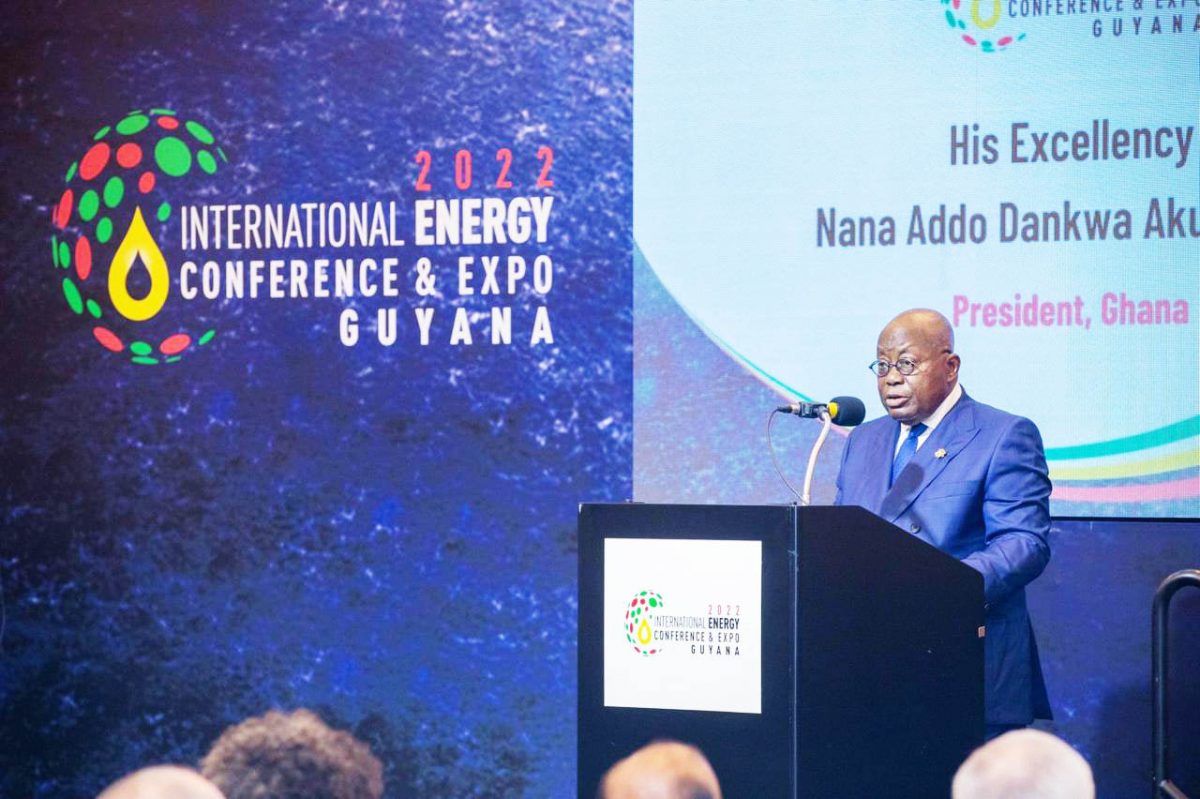Ghanaian President Nana Dankwa Akufo-Addo yesterday stated that while the government here should pursue ambitious policies for the sustainability of the oil & gas sector and its co-existence among other industries, if the concerns of some stakeholders are not properly represented, ventures should not be pursued.
“No matter how high, its return on value is not worth it if the interest of some or the majority of the stakeholders are not properly represented and they are left impoverished and dissatisfied,” the President of Ghana asserted.
The African leader in his address during the opening of the International Energy Conference being held at the Marriott Hotel in Georgetown opined that government should craft policies in line with its goals for development of petroleum business, co-existence between the petroleum sectors and other industries while heeding environmental considerations.
At the same time, President Akufo-Addo noted that countries like Guyana and Ghana must find ways of bringing their substantial hydrocarbon resources to production and do so quickly.
“We must add value to these resources, and not export them in their raw form if we are to transition to the status of developed countries,” he posited.
In his address, Akufo-Addo questioned, “How do we bridge the gap if we are not allowed to exploit the resources that we have been blessed with…?
He pointed out that the western countries which are large contributors to carbon emissions are the ones looking at countries like Guyana and Ghana and making negative comments concerning their developmental path.
Nonetheless, he told the audience that “the effects of climate change, particularly on the continent of Africa have been catastrophic. Agriculture, water and energy are essential drivers of development in our countries.”
He stressed that developing countries have “a solemn duty to take immediate and bold steps to protect global climate from going beyond unbearable limits. It is in our own interest to salvage the economic fortunes of the continent, and more so, step up our collective efforts to fight decisively against climate change, to fight against climate change more aggressively.”
Nonetheless, Akufo-Addo stressed that the government must look at the petroleum sector to become a cutting edge industry with a strong focus on health, environment, and safety at all levels. It is critical, he added, for there to be a management of socio-economic and environmental benefits of the sector as it changes continually.
He stressed that the flaring of natural gas should not be encouraged and government must “minimise the flaring or venting of natural gas and develop a viable domestic petrochemical industry based on natural gas.”
Since the startup of operations here, a faulty flash gas compressor has resulted in the flaring of some 16 million cubic feet of gas per day on the ExxonMobil Liza Destiny FPSO.
Production Manager Mike Ryan, in a video statement last week, said that at the moment, the focus is on commissioning the Unity’s compression train, while acknowledging to the “challenges” with the flash gas compressor system on the Liza Destiny FPSO.
“I am very disappointed about that. The team continues to work extremely hard to resolve that issue and try to minimise flare as best we can within that design,” he said, while noting that the Liza Unity uses a different design altogether.
The company has been subjected to fines by the Environmental Protection Agency for every tonne of excess carbon dioxide emitted.
Advising on measures for the effective management of the oil & gas sector, President Akufo-Addo said that government should pursue ambitious environmental and resource management policies for the sustainable sector and its co-existence among other industries
The President of Ghana went on to state that investments must be encouraged along the oil and gas supply chain through incentivisation and practical regulation.
He stressed that there must be partnering between foreign and local companies. This, he said, will allow for the maximising of wealth from the utilisation of local services, people, and companies that will retain the benefits in the country.
“It is not about nationalisation but a vehicle to partnering investors with locals… ensuring social harmony and cohesion,” the President of the African state stressed.
He went on note that the citizenry of the country must be the ultimate beneficiaries of the sector and this should be reflected in every budget as resources should be a significant contributor in the budgets moving forward. He added that there must be equity for the benefit of all through institutional reforms and legislative changes.
Of a menu of initiatives shared by the Ghanaian Head of State, he suggested that Guyana make provisions for capacity building by offering opportunities in the various sectors for the skills development of its citizens.
He said that he was happy to learn that the Local Content Secretariat will be established soon and his Ministry of Energy stands ready to assist. He noted that there will be opportunities for technical internships, secondment and work exchange programmes for staff to benefit from.
Akufo-Addo declared that the time has come to build stronger nations and work together to build a future that benefits the people.






